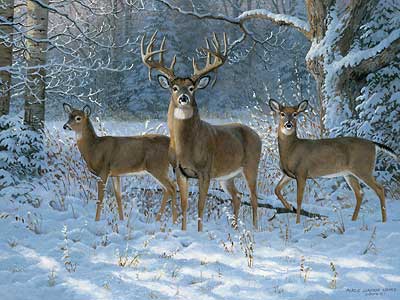Preventing Winter Animal Damage
 Winter is a tricky time for your landscape. When the temperature falls, the risk of plant damage grows. But many people fail to realize that some damage may not come from the weather, but from animals. Several animals, such as deer, voles and rabbits can take a literal bite out of your landscape. So what can be done about it?
Winter is a tricky time for your landscape. When the temperature falls, the risk of plant damage grows. But many people fail to realize that some damage may not come from the weather, but from animals. Several animals, such as deer, voles and rabbits can take a literal bite out of your landscape. So what can be done about it?
Voles
When bark has been chewed off a tree or shrub at the ground level, the main culprits are voles and meadow mice. They have upper and lower incisors that leave characteristic up-and-down chewing marks at ground level or slightly above. When all the bark is chewed off at the ground level, the plant has much greater trouble surviving the winter.
Voles are especially dangerous because they will dig under the mulch or snow and create tunnel systems. To prevent this, wrap young trees in hardware cloth cylinders. Bury the wire 6 inches into the ground to keep voles from burrowing under the cylinder.
Rabbits
Rabbits, like voles, have long upper and lower incisors and will leave bigger chew marks on bark. Low twigs and buds are susceptible to rabbit damage as well. Rabbits will stand upright on hard packed snow; reaching up to 18 inches above snow cover.
A great way to protect against rabbits is to use chicken wire or chicken mesh around small plants and shrubs. The fencing should be at least 18-24 inches high and should be buried into the ground 2-3 inches to prevent tunneling underneath.
Be mindful when using repellents. Repellents only protect the parts of the plant that have been sprayed. New growth will be unprotected and susceptible to rabbit damage. Heavy rains may also require reapplication as well.
Deer
Deer can be very frustrating to deal with. Deer are creatures of habit, once they view your home as a safe place, they will visit frequently. When food becomes scarce, they will eat just about anything too. Because of this, deer should be discouraged immediately when they first appear.
Deer damage is usually identified by the torn or jagged appearance of branches or twigs compared to the clean-cut damage done by voles or rabbits. Male deer also cause damage by rubbing their antlers along the stems or trunks of trees and stripping off bark.
There are several ways to prevent deer damage. First, you should physically restrict deer by enclosing your entire yard 8 foot tall fencing. Second, use a repellent. Finally, there are some plants that deer don’t find particularly palatable. For a complete list, check out this article on the best plants to grow in the Midwest to discourage deer.
Let Ryan Lawn and Tree help with ALL your lawn care needs. Give us a call at 855-216-2293 for expert advice from your trusted Ryan Pros for a healthy and natural lawn!









